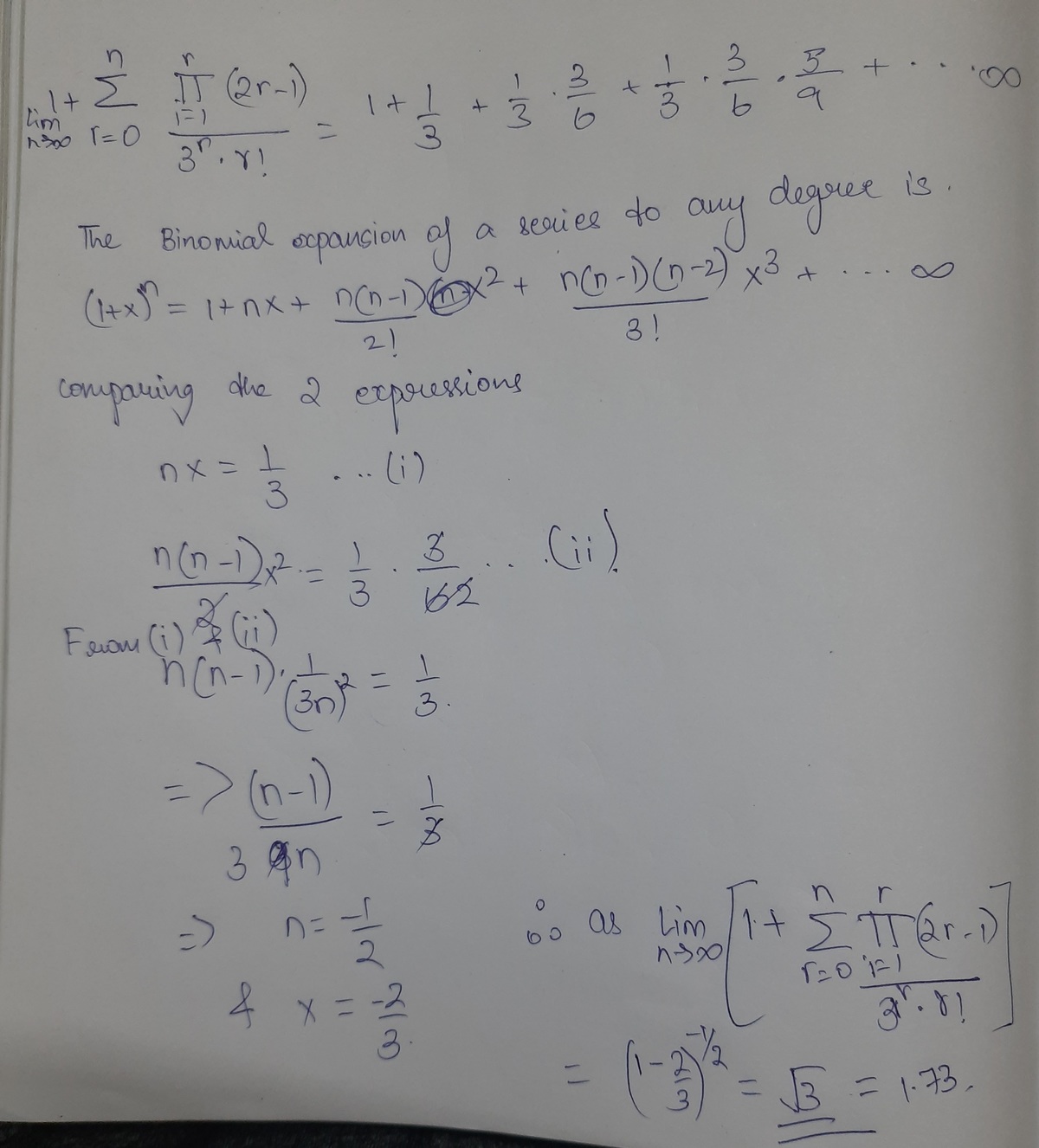Limits and binomial theorem
n → ∞ lim ( 1 + r = 1 ∑ n 3 r r ! 1 i = 1 ∏ r ( 2 i − 1 ) ) = ?
The answer is 1.73.
This section requires Javascript.
You are seeing this because something didn't load right. We suggest you, (a) try
refreshing the page, (b) enabling javascript if it is disabled on your browser and,
finally, (c)
loading the
non-javascript version of this page
. We're sorry about the hassle.
3 solutions
so hard . wish to learn one day.. soon
Did the same way....
You are just guessing it is a power series, it won't work if it does not. Chew-Seong Cheong's solution is better.
Log in to reply
His guess that it is a power series is justified because the terms when rearranged are taking the form of the central binomial coefficient(if we cosider the 3^r as just x^r). So a power series in terms of binomal theorem for any index is a good guess. Not to mention that the solution @Chew-Seong Cheong has used is the taylor expansion of 1 − 2 x 1 . Now the coefficients are indeed the binomial coefficient which is generalized for any n. So there is nothing wrong with this solution. The general term of the binomial expansion of 1 − 2 x 1 is r ! x r ( 2 r − 1 ) ! ! , r > 0
given series can be written as
S = r = 0 ∑ ∞ ( r 2 r ) 6 r 1
which is equal to the coeffcient of x 0 in the expansion of
f ( x ) = k = 0 ∑ ∞ ( x 1 + 6 x ) 2 k
and for 0 < ∣ ( x 1 + 6 x ) ∣ < 1
f ( x ) = 1 − ( 6 x 6 + x 2 ) 2 1
f ( x ) = x 4 − 2 4 x 2 + 3 6 − 3 6 x 2
f ( x ) = ( x 2 − α ) ( β − x 2 ) 3 6 x 2
f ( x ) = α − β 3 6 x 2 ( x 2 − α 1 + β − x 2 1 )
f ( x ) = α − β 3 6 ( 1 − x 2 α 1 + β ( 1 − β x 2 ) x 2 )
f ( x ) = α − β 3 6 k = 0 ∑ ∞ ( ( x 2 α ) k + ( β x 2 ) k + 1 )
coffcient of x 0 is α − β 3 6 and α − β = 1 2 3
so answer is 3

S = 1 + r = 1 ∑ ∞ 3 r r ! 1 i = 1 ∏ r ( 2 i − 1 ) = 1 + r = 1 ∑ ∞ 3 r r ! ( 2 r − 1 ) ! ! = 1 + r = 1 ∑ ∞ 3 r ⋅ 2 r ( r ! ) 2 ( 2 r ) ! = 1 + r = 1 ∑ ∞ ( r 2 r ) ⋅ 6 r 1 = r = 0 ∑ ∞ ( r 2 r ) ⋅ 6 r 1 = 1 − 3 2 1 = 3 ≈ 1 . 7 3 Since n = 0 ∑ ∞ ( n 2 n ) x n = 1 − 4 x 1